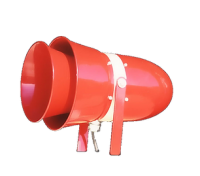F-2
| Sentry F-2
Sterling F-2 | |

| |
| Company | |
|---|---|
| Produced | Early 1950s-present |
| Type | Directional Electromechanical |
| Sound output | 117 dB @ 10ft (outdoors)
103 dB @ 10ft (indoors) |
| Horsepower | 1/5 hp |
| Voltage | 110/220/250 V V AC/DC |
| Preceded by | Sterling Type F |
| Documentation | Manual |
The Type/Model F-2 (Factory siren, version 2) is a small industrial electric siren produced by Sentry Siren, Inc, and formerly the Sterling Siren Fire Alarm Company. Intended as a small industrial or rural fire siren, these sirens are the main competitor to the Federal Signal Model A and Model L.
The Sentry F-2 continues to be sold by Sentry Siren, as well as its dealers such as Edwards and W.S. Darley & Co. The siren is fairly popular in the industrial market, as well as with rural fire stations who do not need a larger siren. The F-2 is very commonly used on drawbridges to alert of the bridge raising as well.
Due to being easy to run, these sirens often end up in the hands of collectors. They are also quite popular in both the industrial and fire department markets, as they're suitable for short range indoor and outdoor use. However, they are greatly outsold by Federal's offerings.
History and design
The Model F-2 was released sometime in the early 1950s by Sterling Siren, as a refined version of their existing Type F industrial siren. Ads for the siren exist as early as 1955. The Type F had become antiquated, and other siren designs were outperforming and outselling it. As a result, Sterling would give the siren a complete redesign that would be later carried over by Sentry Siren.
The siren's specifications remained the same, using the same rotor, stator, and motor, with the only change to the stator being the addition of finger guards, which the Type F lacked. The siren uses an 5 inch 8-port rotor and stator, driven by a 1/5 hp high speed universal motor that operates at 14,000 RPM. The siren's housing was switched from steel to stainless steel, greatly improving the siren's weather and corrosion resistance. The siren's flared intake was replaced by a smaller conical intake, and the large bell-shaped skirt was replaced with a conical skirt that sits flush with the rear motor cover, which is now larger and more rounded.
The stand was redesigned as well, being flush with the bottom of the siren, wider and with 4 screw holes. Unlike the Type F, the F-2's mount was cast to the bottom of the siren and could not swivel up or down. When Sentry took over around 1973, the stand was simplified to little more than three thin sheets of metal with holes for mounting the siren to ceilings, floors or walls, which were attached to the sides of the siren and could pivot up or down. The siren is balanced well enough to stand despite the stand being very thin. The power cable now feeds through the bottom middle of the siren as well. These design changes make the F-2 much simpler and easier to manufacture. The F-2 continued to be sold by Sentry Siren, Inc after they took over operations, with minimal changes to the siren over the years such as differing tags. Unlike the Type F, the F-2 could be ordered with a 250 V AC/DC motor if desired. The F-2 is approved for use by the United States Navy on their warships, and F-2 units built for this purpose use stainless steel construction, and a wider stand that is better suited to absorb shock and impact.
F-5 and F-10
Two additional models were introduced by Sentry around 2000, the F-5 and F-10. These were also sold by W.S. Darley & Co. as the "Mighty Mite". Very little is known about these sirens besides their appearance in a few advertisements and Sentry's old website. The F-5 was the single head variant of the siren, while the F-10 was the dual head variant. The sirens consisted of a very small rotor and stator of unknown port count, driven by a 12 or 24 V DC/120 or 240 V AC universal motor at a high speed. The rotor and stator were housed in a projector assembly, with a circular grille protecting the rotor and stator. The projectors had slotted openings on each side to allow sound to project more evenly around the siren, and were bolted right onto the motor. The motor is bare with exposed cooling fins and also has the mount attached to it. The siren could be mounted horizontally, vertically, in confined spaces due to its small size, or even used as a (rather excessive) car alarm due to its ability to run on a 12 V battery.
The F-5 was rated at 104 dB at 10 ft, while the F-10 was rated at 107 dB at 10 ft. Both sirens were weaker in performance than the F-2 while competing in the same market, which likely led to their demise. It is unknown whether or not any of these were sold or even produced in the first place, as there are no known extant units of either of these. The sirens vanished from Sentry's site in 2001 and discontinued.